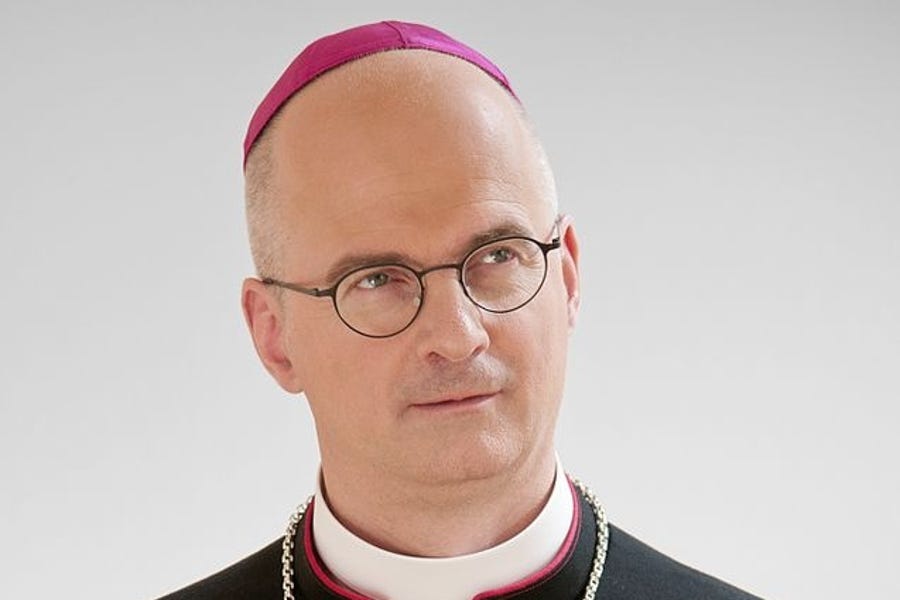
Swiss bishop bans charismatic community
The Koinonia John the Baptist community has reportedly been denied recognition as an ecclesial movement by the Vatican Dicastery for Laity, Family Life, and Youth.
A Swiss Catholic bishop has banned a charismatic group from operating in his diocese.
Bishop Charles Morerod announced March 20 that the Koinonia John the Baptist community was forbidden to engage in any activity in his Diocese of Lausanne, Geneva, and Fribourg.

Morerod, a member of the Dominican order who has served as secretary general of the International Theological Commission, accused the community of failing to provide “all the necessary information” before he signed an agreement with it in 2020.
He said that he had only learned recently that the group had been rejected for public canonical recognition by the Vatican Dicastery for the Laity, Family, and Life.
“I know that this decision may seem difficult for the people concerned and for the faithful who followed the life of this community,” he said. “However, all these people will be taken care of so that they can be accompanied in their faith by a diocesan team.”
Koinonia John the Baptist, a private association of the faithful, describes itself as “a community at the service of the New Evangelisation, within the Catholic Church.” Koinonia is a Greek word often translated as “fellowship” or “community.”
But recognition as a private association is a local phenomenon, and the community is not recognized universally in the Church as an ecclesial movement or a public juridic person.
The group sums up its spirituality with the acronym “KeKaKò,” which stands for “kerygmatic proclamation (Ke), charismatic action (Ka), and love lived as friendship, or koinonia (Ko).”
The community was founded in 1979 by the Argentine priest Fr. Ricardo Argañaraz, who had retreated to a life of prayer, work, and study in a hamlet called Camparmò in northeastern Italy.
In 1999, he stepped back “from every role and position of governance” in the community, and the priest was in the same years reportedly convicted of fraud, after a former member of the community charged he took money from her under false pretenses.
At the same time, Argañaraz found himself involved in a complex canonical situation in which the circumstances of his incardination were called into question. It is not clear how that controversy has resolved, or where the priest is actually incardinated.
Koinonia John the Baptist says it has more than 10,000 members and is present on all five inhabited continents. In the U.S., the community is active in California, Connecticut, and New York.
The group has operated in Switzerland since 2012, organizing evangelization meetings and healing Masses. It says it was welcomed into the Diocese of Lausanne, Geneva, and Fribourg in October 2018 and established a small community of consecrated life in Semsales, in the canton of Fribourg, in September 2019. Bishop Morerod signed the agreement with the community on June 2, 2020.
Morerod, a former rector of the Angelicum in Rome, told the Swiss Catholic website kath.ch that he had assumed the group was formally recognized by the Vatican as it was active in many dioceses.
“That was a mistake,” he said, adding that he did not know why the Vatican had withheld canonical recognition.
He said: “I hope that the reasons will be known.”
Kath.ch reported that two other charismatic communities in the Diocese of Lausanne, Geneva, and Fribourg had encountered difficulties: Verbe de Vie and the Community of the Beatitudes, whose founder, Gérard Ephraim Croissant, was found in 2011 to have committed both spiritual and sexual abuse against both members of the community and against minors.
“We have seen time and again that some of these communities develop sectarian traits. This opens the door to abuse of all kinds,” the website quoted Morerod as saying.
The Vatican has taken steps to increase its oversight of associations of the faithful, which can be either private or public.
In June 2022, Pope Francis decreed that bishops must obtain Vatican permission before approving the creation of a public association of the faithful in their dioceses, if the association hopes to become a religious community.
Associations of the faithful are defined in canon law as groups that “strive in a common endeavor to foster a more perfect life, to promote public worship or Christian doctrine, or to exercise other works of the apostolate such as initiatives of evangelization, works of piety or charity, and those which animate the temporal order with a Christian spirit.”
In a newly revised version of Vos estis lux mundi, released last month, Pope Francis expanded the prospect of investigating the leaders of ecclesial movements for charges of abuse or administrative negligence.





